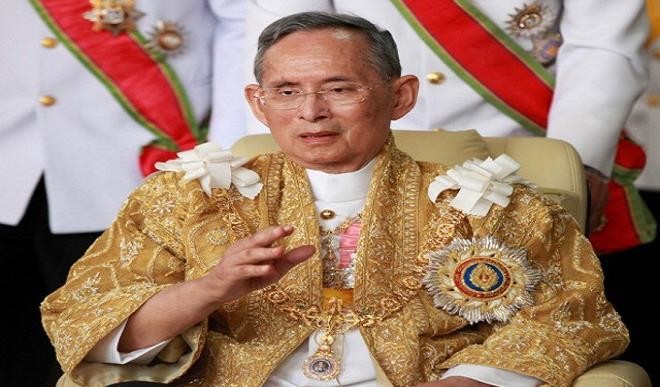
Thailand’s King Bhumibol Adulyadej, the world’s longest reigning monarch, died on Thursday at age 88, the royal household said in a statement.
No cause of death was given. The statement said that "doctors [at Siriraj Hospital] treated the ailing king to the best of their ability, but the king’s health continued to deteriorate before he passed away peacefully."
The time of death was given as 3:52 pm (0852 GMT).
The king had spent much of his time since 2009 in Siriraj, where he continued to perform his largely ceremonial duties as head of state. His last public appearance was in January.
Bhumibol was a beloved and unifying figure in Thailand, whose 70 years on the throne provided a consistent backdrop of stability to the frequent turbulence of Thai politics.
Revered by Thais as semi-divine, the king enjoyed near-universal admiration. His portrait is ubiquitously displayed throughout the country in gilded tributes along roadsides, in shops, homes and official buildings, and on coins and paper currency.
His reign exceeded those of Queen Victoria of Britain (63 years) and Emperor Hirohito of Japan (62 years), making Bhumibol’s tenure as head of state one of the longest in recorded history.
Born on December 5, 1927 in Cambridge, Massachusetts, Bhumibol was the second son of Prince Mahidol, Thailand’s "father of modern medicine," who was studying public health at Harvard University at the time of Bhumibol’s birth.
Bhumibol grew up mostly abroad, spending his formative years in Lausanne, Switzerland.
His elder brother, King Ananda Mahidol, died under mysterious circumstances in 1946, bringing the shy young Bhumibol to the throne at a time of political uncertainty, only 14 years after the country’s 700-year absolute monarchy was ended by a military coup.
Bhumibol ascended to the throne on June 6, 1946.
Many Thai leaders then considered the monarchy to be an archaic institution, but the rise of communism in South-East Asia led Thailand’s military dictators in the 1950s and 1960s to elevate the role of the king in an attempt to counter a growing insurgency.
Old ceremonies from the days of absolute monarchy were reinstituted and widely promoted, and Bhumibol led official rituals to mark important religious and political events.
Bhumibol was also sent on a worldwide tour in 1960, in which he and his wife, the fashionable Queen Sirikit, visited 23 countries, including the United States and most European capitals.
The tour was well received in Thailand, and images of Bhumibol playing saxophone with Benny Goodman and socializing with Elvis Presley adorn the homes of many Thais to this day.
Bhumibol also became the first Thai monarch to visit the distant reaches of his kingdom, winning his subjects’ hearts with his humble and personal approach, and through the outreach programmes he championed to help alleviate the sufferings of the poor.
During the years of military-dominated politics and 17 coups d’etat between 1932 and 1991, Bhumibol developed a low-profile political style and saviour-of-last-resort role that arguably brought the country through its worst periods of crisis.
"Thais, in general, willingly and unreservedly accord him the confidence and trust that no other monarch in our history, or for that matter any other monarch in the world, has ever enjoyed," former prime minister Anand Panyarachun said in a 1996 speech.
The king’s popularity derived from his dedication to rural development projects, strict adherence to Buddhist precepts and a commitment to the common good.
In 1992, the king famously ended a confrontation between pro-democracy demonstrators and the military by calling in the two chief protagonists – former army commander-in-chief Suchinda Krapayoon and politician Chamlong Srimuang – for a personal audience.
In a televised broadcast, the two knelt before Bhumibol like naughty schoolboys receiving a scolding. The king’s actions ended the bloody street fighting that had claimed at least 44 lives and brought Thailand to the verge of political chaos.
In recent years, Bhumibol increasingly spent time outside the public eye, resting in the palace and being treated in hospital.
A strict lese majeste law seeking to protect the king’s image was enforced more regularly, and successive governments oversaw a dramatic rise in such cases, with some leading to lengthy prison sentences of up to 15 to 20 years.
Academics and commentators have long called for the law’s repeal, saying it is widely abused and used as a tool simply to silence government critics and political opponents.
Critics of the law also cite a 2005 speech in which Bhumibol himself said he should not be above criticism.
Despite the rise in lese majeste cases in recent years, Bhumibol remained enormously popular in Thailand, where both sides of the deeply divided country long viewed him as a stabilizing figurehead.
The king’s death immediately raised the delicate question of royal succession. Bhumibol is survived by his wife Queen Sirikit, his son, Crown Prince Vajiralongkorn, and three daughters.
Prince Vajiralongkorn, 64, does not command the same respect among Thais that his father did. (DPA)

 Join Daily Trust WhatsApp Community For Quick Access To News and Happenings Around You.
Join Daily Trust WhatsApp Community For Quick Access To News and Happenings Around You.


